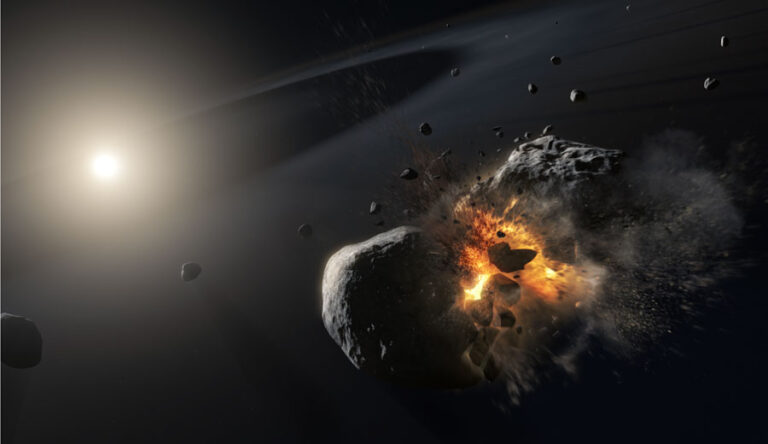
Proxima Centauri Releases Powerful Flare
The Sun dwarfs its nearest stellar neighbor, but Proxima Centauri's flares pack a comparatively energetic punch.

Far-out Gas Giant Exoplanet Puzzles Astronomers
Astronomers have discovered a super-Jupiter orbiting its young star on a surprisingly wide orbit. How did it get there?

Spotting a Faint Escaping Atmosphere
Low-density exoplanets orbiting close to their host stars tend to lose their atmosphere. Now, astronomers can measure how fast it disappears.

Rocky Planet Found Around 10 Billion-Year-Old Star
Astronomers have found an Earth-size (but not at all Earth-like) planet around an ancient star that has a nice high view of our galaxy.

Radio Transmission from a Brown Dwarf
The radio discovery of a brown dwarf holds promise for future exoplanet detections.

Earth-size Planets Are Common, Kepler Retrospective Finds
A new, full analysis of Kepler data finds at least 300 million Earth-size planets in the habitable zone around Sun-like stars in our galaxy.

60-second Astro News: Mature Infant Galaxies & A Possibly Rogue Planet
This week in astronomy news: Distant galaxies that look older than they are and a terrestrial planet that might be drifting through our galaxy.

Giant Planet Found Around a White Dwarf
Astronomers have found a Jupiter-size planet orbiting a much smaller white dwarf. The discovery shows what a system might look like after its star's death.

First Image of a Young Sun and Two Giant Planets
For the first time, astronomers have imaged multiple planets orbiting a Sun-like star.

Alignment of a Star and a Planet
Unlike in our solar system, not all planets orbit in the same direction as their stars rotate. A nearby planetary system may reveal how these orbits form.

Close Encounters in the Milky Way — and What They Mean for Planets
New research shows stellar flybys are common in our galaxy’s crowded center. That could have both good and bad (but mostly bad) effects on growing planets.

Three Nearby Exoplanets to Explore
A trio of nearby exoplanets make tempting new targets for next-gen telescopes.

First Discoveries of a Pro-Am Exoplanet Survey
A pair of professional and amateur astronomers have teamed up to fill an important niche in exoplanet research.

Are We Watching a Planet Disintegrate?
Among the wealth of exoplanets we’ve discovered beyond our solar system, some are temperate, some less so. New observations have now revealed what may be a particularly inhospitable environment: a planet literally disintegrating as it orbits its host.

Astronomers Witness the Birth of Planets
Two new sets of observations show astronomers what planet formation looks like.

Rescuing an Overlooked Planet
The Kepler False Positive Working Group has identified an Earth sized planet in the habitable zone of a M-dwarf star that was marked as a false positive.

Fomalhaut b: Exoplanet or Puff of Dust?
Is Fomalhaut b “the planet that never was”? Astronomers continue to contest the nature of this directly imaged object around a nearby star.

How Amateurs Could Help Future Exoplanet Observations
Large observatories will require precise timing info to measure as many exoplanet atmospheres as possible. Backyard astronomers have the power to keep that intel fresh.

Iron Might Rain on This Hot Jupiter
New observations show a signature that could come from iron rain on one side of hot Jupiter WASP-76b.

60-Second Astro News: Planets in Tight Quarters & Kuiper Belt Forays
Astronomers have calculated the loss of planets around stars in globular clusters, and New Horizons returns observations of worlds in the outer solar system.
